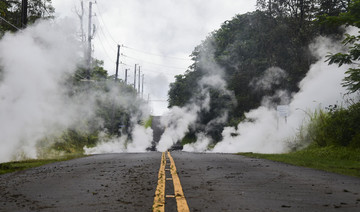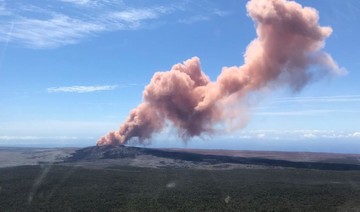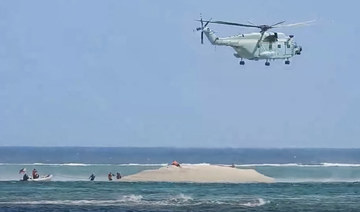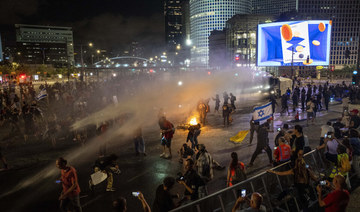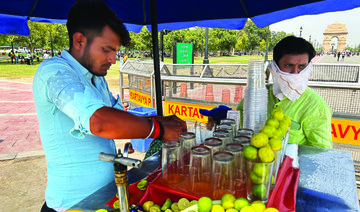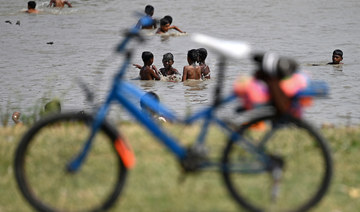PAHOA, Hawaii: Hundreds of anxious residents on the Big Island of Hawaii hunkered down Saturday for what could be weeks or months of upheaval as the dangers from an erupting Kilauea volcano continued to grow.
Lava spurted from volcanic vents, toxic gas filled the air and strong earthquakes — including a magnitude 6.9 temblor on Friday — rocked an already jittery population. The trifecta of natural threats forced the evacuation of more than 1,700 people from communities near the lava and prompted the closure of parks, college campuses and a section of the main road through the area on the Big Island’s southern tip.
Five structures have burned and thousands of customers briefly lost power from one of the larger quakes.
Tesha “Mirah” Montoya, 45, said toxic fumes escaping from the lava vents weren’t enough to make her family evacuate, but the tipping point were the earthquakes.
“I felt like the whole side of our hill was going to explode,” she said. “The earthquake was what made us start running and start throwing guinea pigs and bunnies in the car.”
Montoya, her husband and daughter don’t know how long they will be away from the three-story octagonal house they built nearly 20 years ago from a patch of “raw jungle.”
“My heart and soul’s there,” she said in a phone interview from a cabin on the north side of the Big Island, where the family had hunkered down. “I’m nothing without the land. It’s part of my being.”
Tina Neal, the scientist in charge of the US Geological Survey’s Hawaiian Volcano Observatory, warned distressed residents at a community meeting late Friday that eruptions could last longer than the ones from earlier this week, and earthquakes and aftershocks could continue for days, even weeks.
Gary McMillan said his home is about 3,000 feet (914 meters) from one of the fissures that is spewing lava and gas into Leilani Estates. He has remote cameras set up in his home and says that as of now his home is still intact.
He’s living out of his van with his wife at the nearby community center and constantly thinks about the things they were forced to leave behind — but understands why authorities are keeping residents out.
“I was a critical care nurse for 37 years, so I understand the health implications and the dangers involved,” McMillan said.
The lava lake at Kilauea’s summit crater dropped significantly, suggesting the magma was moving eastward toward Puna, a mostly rural district of forests, papaya farms and lava fields left by past eruptions.
Officials warned of the dangers of spattering hot rock and high levels of sulfuric gas that could threaten the elderly and people with breathing problems.
Hawaii Volcanoes National Park evacuated all visitors and non-emergency staff. The quakes triggered rock slides on park trails and crater walls. Narrow fissures appeared on the ground at a building overlooking the crater at Kilauea’s summit.
The University of Hawaii at Hilo and Hawaii Community College both closed campuses and a long stretch of Highway 130, one of the main arteries through Puna, was closed because of the threat of sulfuric gas.
Leilani Estates, where lava was pushing through cracks in the earth, has about 1,700 residents and 770 homes. A nearby neighborhood, Lanipuna Gardens, which has a few dozen people, also was evacuated.
Kilauea has been continuously erupting since 1983 and is one of five volcanoes that make up the Big Island. Activity picked up earlier this week, indicating a possible new lava outbreak.
The crater floor began to collapse Monday, triggering earthquakes and pushing the lava into new underground chambers. The collapse caused magma to push more than 10 miles (16 kilometers) downslope toward the populated southeast coastline.
Residents have faced lava threats before.
In 2014, lava burned a house and destroyed a cemetery near the town of Pahoa. Residents were worried it would cover the town’s main road and cut off the community from the rest of the island, but the molten rock stalled.
From 1990 through 1991, lava slowly overtook the town of Kalapana, burning homes and covering roads and gardens.
Kilauea hasn’t been the kind of volcano that shoots lava from its summit into the sky, causing widespread destruction. It tends to ooze lava from fissures in its sides, which often gives residents at least a few hours’ warning before it reaches their property.
In the uncertainty, however, some residents found comfort in the abiding beauty of the Big Island. Evacuees Todd Corrigan and his wife awoke to a beautiful sunrise Saturday in Puna after spending the night in their car at the shore.
“Paradise isn’t always perfect,” he said, “but it’s still beautiful.”
Hawaii braces for long upheaval as erupting Kilauea boils
Hawaii braces for long upheaval as erupting Kilauea boils
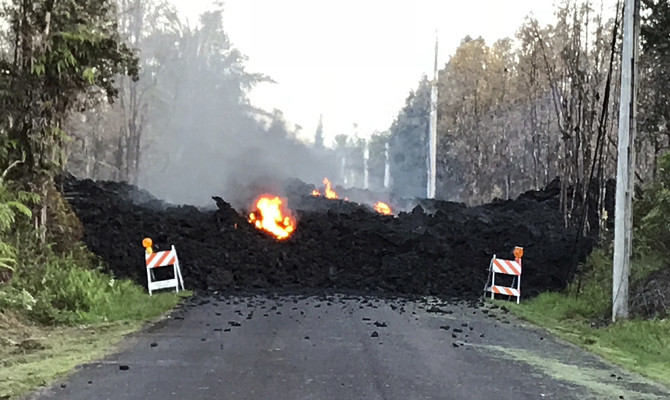
- Threats from the volcano forced the evacuation of more than 1,700 people from communities near the lava and prompted the closure of parks and college campuses.
- Kilauea has been continuously erupting since 1983 and is one of five volcanoes that make up Hawaii's Big Island.
Former Thai Prime Minister Thaksin Shinawatra will be indicted for royal defamation, prosecutors say
Former Thai Prime Minister Thaksin Shinawatra will be indicted for royal defamation, prosecutors say

- The former prime minister will also be indicted for violating the Computer Crime Act
- Thaksin had been in self-imposed exile since 2008, but returned to Thailand in August last year
Thaksin will not yet be indicted because he had filed a request to postpone his original appointment on Wednesday with proof that he has COVID-19, Prayuth Bejraguna, a spokesperson for the Office of the Attorney General, said at a news conference.
The attorney general’s office scheduled a new appointment for Thaksin’s indictment on June 18, Prayuth said, adding that Thaksin will also be indicted for violating the Computer Crime Act.
Thaksin had been in self-imposed exile since 2008, but returned to Thailand in August last year to begin serving an eight-year sentence. He was released on parole in February from the hospital in Bangkok where he spent six months serving time for corruption-related offenses.
On his return, he was moved almost immediately from prison to the hospital on grounds of ill health, and about a week after that King Maha Vajiralongkorn reduced his sentence to a single year. Thaksin was granted parole because of his age — he is 74 — and ill health, leaving him free for the remainder of his one-year sentence.
His return was interpreted as part of a political bargain between his Pheu Thai Party and the conservative establishment — longstanding rivals — to stop the progressive Move Forward Party from forming a government following its victory in last year’s general election.
After his return, the attorney general’s office said it had revived an investigation into whether Thaksin almost nine years ago violated the law against defaming the monarch, a crime punishable by up to 15 years in prison.
Thaksin was originally charged in 2016 with violating the law for remarks he made to journalists when he was in Seoul, South Korea, a year before that, but the investigation could proceed only after he was presented with the charge in person in the hospital in January, officials said. Thaksin had denied the charges and submitted a statement defending himself.
Prosecutor’s spokesperson Prayuth said there is enough evidence for the attorney general to indict Thaksin. He said the prosecutors have already prepared their statement and documents to present to the court next month.
Since his release, Thaksin has maintained a high profile and is believed to be wielding influence in the government led by Prime Minister Srettha Thavisin. One analyst believes Thaksin’s growing influence has angered the ultra-conservatives and that the indictment is their response.
“It is designed to keep Thaksin under control. This is keeping him on a leash. If he doesn’t behave then this charge can be activated and could land him in jail. This is to curtail his movement and his maneuvers and to remind him, sending him a signal in a way, to know who’s in charge and to know he should not overstep the boundary,” said Thitinan Pongsudhirak, at professor at Bangkok’s Chulalongkorn University.
South Africans start voting in election that could see ANC lose majority

- Voters are electing nine provincial legislatures and a new national parliament
- More than 27 million people registered to vote out of a population of roughly 62 million
JOHANNESBURG: South Africans started voting on Wednesday in an election that could mark a big political shift if the governing African National Congress party loses its majority as opinion polls suggest.
Voters are electing nine provincial legislatures and a new national parliament, which will then choose the country’s next president.
If the ANC gets less than 50 percent of the national vote it will have to seek one or more coalition partners to govern the country, the first such alliance in the 30 years since it swept to power with Nelson Mandela as its leader at the end of apartheid.
Voting stations opened at 0500 GMT and will close at 1900 GMT, with more than 27 million people registered to vote out of a population of roughly 62 million.
South Africa’s electoral commission is expected to start releasing partial results within hours of voting stations closing. The commission has seven days to announce final results.
Philippines president says new China coast guard rules ‘worrisome’

- China has maritime sovereignty disputes with the Philippines and other claimant countries in the South China Sea
- New rules effective June 15 that would enforce a 2021 coast guard law and allow detention of foreigners suspected of trespassing
MANILA: Philippines President Ferdinand Marcos Jr. said on Wednesday new rules outlined by China’s coast guard that could result in the detention of foreigners in the South China Sea were an escalation and “worrisome.”
China, which has maritime sovereignty disputes with the Philippines and other claimant countries, has issued new rules effective June 15 that would enforce a 2021 coast guard law and allow detention of foreigners suspected of trespassing.
China routinely accuses vessels of trespassing in areas of the South China Sea that fall inside the exclusive economic zones of its neighbors and has clashed repeatedly with the Philippines in the past year.
“The new policy of threatening to detain our own citizens, that is different. That is an escalation of the situation,” Marcos told reporters while on a state visit in Brunei.
The Philippines “will use any point of contact with China to stop aggressive actions” and allow Filipino fishermen to fish in the South China Sea, Marcos said.
If aggressive actions are managed, Marcos said, “then we can go all about our business in a peaceful way.”
Marcos has taken a tougher line than his predecessor over China’s actions in the South China Sea, emboldened by support from defense ally the United States, as well as Japan and Australia.
China’s embassy in Manila did not immediately respond to a request for comment.
Beijing claims jurisdiction over most of the South China Sea, a conduit for more than $3 trillion in annual ship-borne trade.
In 2016, an international arbitral tribunal said China’s vast claims had no basis under international law, a decision Beijing has rejected. China insists historic records and old maps make clear it has sovereignty over most of the sea and many islands there.
Clashes erupt at Israeli embassy protest in Mexico

- Around 200 people joined the “Urgent action for Rafah” demonstration
MEXICO CITY: Clashes broke out Tuesday between police and protesters outside the Israeli embassy in Mexico, rallying against the country’s military offensive in the southern Gazan city of Rafah, AFP journalists said.
Some protesters covered their faces and threw stones at riot police who blocked their path to the diplomatic complex in the city’s Lomas de Chapultepec neighborhood.
Around 200 people joined the “Urgent action for Rafah” demonstration, about 30 of whom started to break down barriers preventing them from reaching the Israeli mission.
Police officers deployed tear gas and threw back the stones hurled at them by protesters.
The demonstration was called in response to an Israeli strike which ignited an inferno in a displacement camp outside Rafah, killing 45 people according to Palestinian officials.
Indian capital records highest-ever temperature at 49.9°Celsius: weather bureau

- New Delhi authorities have also warned of the risk of water shortages as the capital swelters in an intense heatwave
- Warnings on heat’s impact on health, especially for infants, the elderly and those with chronic diseases
NEW DELHI: Temperatures in India’s capital soared to a record-high 49.9° Celsius on Tuesday, the government’s weather bureau said.
The India Meteorological Department (IMD), which reported “severe heat-wave conditions,” recorded the temperatures at two Delhi suburbs stations at Narela and Mungeshpur.
Forecasters predict similar temperatures on Wednesday.
In May 2022, parts of Delhi hit 49.2° Celsius, Indian media reported at the time.
India is no stranger to searing summer temperatures.
But years of scientific research have found climate change is causing heatwaves to become longer, more frequent and more intense.
New Delhi authorities have also warned of the risk of water shortages as the capital swelters in an intense heatwave — cutting supplies to some areas.
Water Minister Atishi Marlena has called for “collective responsibility” to stop wasteful water use, the Times of India newspaper reported Wednesday.
“To address the problem of water scarcity, we have taken a slew of measures such as reducing water supply from twice a day to once a day in many areas,” Atishi said, the Indian Express reported.
“The water thus saved will be rationed and supplied to the water-deficient areas where supply lasts only 15 to 20 minutes a day,” she added.
The IMD warned of the heat’s impact on health, especially for infants, the elderly and those with chronic diseases.
At the same time, West Bengal state and the northeastern state of Mizoram have been hit by gales and lashing rains from Cyclone Remal, which hit India and Bangladesh on Sunday, killing more than 38 people.
Bangladesh’s Meteorological Department said the cyclone was “one of longest in the country’s history,” blaming climate change for the shift.



